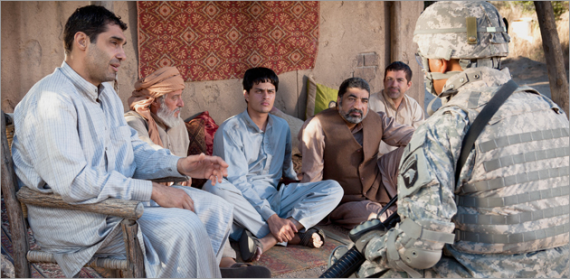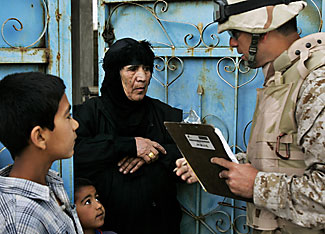Army Linguists: Too Few and Poorly Utilized
Why Big Army has trouble with small wars.

Max Rosenthal explains “How The Army Wastes Linguists Like Me.”
The Army spends years and hundreds of thousands of dollars training each of its foreign-language speakers. At the same time, it uses costly contractors to work the same jobs for which its own linguists have trained. In Iraq and Afghanistan, private-sector linguists are largely replacing their military counterparts rather than augmenting their numbers, an expensive redundancy.
In the fall of 2006, I enlisted in the Army as a cryptologic linguist, one of the soldiers who translate foreign communications. […] Over two years of training followed, both in Arabic and the specific intelligence duties I’d need to perform in-country. In March 2009, I stepped off of a Blackhawk at Forward Operating Base Delta, a large base near al-Kut in southeastern Iraq. I figured I’d be translating captured Arabic communications to alert combat troops of danger.
So imagine my surprise when my new team sergeant picked me up at the airfield and mentioned he was a Korean linguist. It turned out that our five-man team had as many Korean speakers as Arabic ones — you know, for all the Korean spoken in the Iraqi desert. It was my first sign that the deployment wouldn’t be the one I trained for.
When I arrived for my first shift in-country, I quickly saw who would be turning those purloined insurgent communications into English: a large, middle-aged Arab dude, not me. A native of Mosul, he was one of two contractors who would complete every language-related task required for the rest of our deployment. Rumor was he made over $200,000 — easily five times my paycheck. Meanwhile, the military linguists on my team simply sat to one side, numbly monitoring equipment and our computer screens for uneventful hours on end.
[…]
If that’s the way the Army wants it, maybe linguists like me shouldn’t actually deploy at all. Those of us who don’t go to warzones mostly work at intelligence centers like Maryland’s Fort Meade, home of the National Security Agency. Unlike their counterparts overseas, these soldiers routinely work with their adoptive languages while still directly supporting deployed units from afar, like writing reports on collected communications and feeding databases. Their missions continue every day, allowing them to maintain language proficiency. Some defense companies are even working on techy ways to remotely connect linguists far from the front lines with combat troops who need quick translation help.
Meanwhile, linguists who actually go to warzones spend their time at home in a routine of garrison duties and unrelated training, no different from the rest of Big Army. Honing language skills falls far down the priority list. Many end up failing their yearly recertification exams.
At the least, the Army needs to stop treating linguists like we’re interchangeable. Our skills are specific: there’s no reason Korean speakers should be in al-Kut and not Korea. Spanish and French linguists ought to be assigned to, say, Latin America or NATO units, where they’d be useful.
But, hey: if the Army would rather spend hundreds of thousands on contractors to do the job it trained me for, maybe it should just contract out all its language positions. At least then it would get native speakers, who would have a fluency I probably can’t match. It’s expensive, but quality doesn’t come cheap. And redundancy is expensive too.
It’s a bizarre but unsurprising problem. Josh Foust wrote about it in the NYT two years ago, noting that the hired local translators weren’t exactly used with maximum efficiency, either.
United States Army doctrine describes interpreters as “vital,” which is fairly obvious given the bevy of languages spoken in Afghanistan: Dari, Pashto, Tajik, Uzbek and others. Yet the way the military uses translators is too often haphazard and sometimes dangerously negligent. Many units consider interpreters to be necessary evils, and even those who are Americans of Afghan descent are often scorned or mistreated for being too obviously “different.”
Mission Essential Personnel, the primary contractor providing interpreters in Afghanistan, has basic guidelines: interpreters need to be given a place to sleep, for example, and fed. But beyond that, how they are treated is often left up to the individual unit. Many times, they are treated the way they should be: as vital members of a team. Sometimes, however, they are shockingly disrespected.
Big Army, which is essentially the entire force minus special ops types, is a very strange bureaucracy with little understanding of how to use unique assets. No private should be treated differently than another and it would cause resentment if Specialist Rosenthal, the only guy in the unit who spoke Arabic, were spared the guard duty, KP, and shit details (in the case of deployments to desert environments, quite literally) the other lower enlisted soldiers pulled. Naturally, too, he needs to partake of all the same common task training and Infantry skills as the rest of the boys. Keeping his Arabic skills up to speed, well, that’s something he should do on his own time.
And some foreign woman with her head covered in a scarf?! How do you fit her into the unit?
It’s not just linguists and foreigners, either. My MLRS battalion had a GS-12 technical person who acted as the liaison with the manufacturer of the then-new rocket launchers. When we deployed to Desert Storm, he was ordered to deploy with us. Even though he was a retired Army warrant officer, nobody had any idea what to do with him. To this day, I have no idea what he did over there.





While there’s undoubtedly a certain amount of inability to see the forest for the trees in former-Sgt Rosenthal’s viewpoint, much of what he writes matches my own experience as a cryptologic linguist in the Navy. While I don’t understand it, I’ve see the reality up close and personal, and have to accept it: non-linguists just don’t understand much about linguists and how to manage them.
My last assignment before I retired was managing language training for the Navy. My partner-in-crime and I spent the better part of a year devising a strategy for improving the widely-acknowledged poor language proficiency of a majority of our linguists. In a nutshell, it required the Navy to provide regular and meaningful training for our linguists, and after that was accomplished holding the linguists accountable for their proficiency.
After presenting this comprehensive plan to the powers-that-were, it was decided that that whole training thing was too expensive, but they really like that accountability plan, and implemented it alone. Needless to say, I wasn’t very popular with my shipmates after that.
Generally, though, non-linguists can’t understand how language proficiency isn’t just another skill akin to flying an airplane or repairing a boiler. And my experience has been that the vast majority are incapable of being educated on the subject.
@Boyd: As I say, the military doesn’t do “special” very well.
It’s a matter of respect. The military respects the special nature of SpecOps. Just about any other kind of special, not so much.
I was going to make a cunning linguist comment…then decided not to.
@Boyd: And even that took decades. It took a presidential order for SF to get to keep their green berets, which Big Army resented. And, until SOCOM came around, doing more than one tour in SF was a career dead end for an officer, with colonel the top of the food chain. With USSOCOM, though, there are now 4-stars running around with SEAL or SF backgrounds.
Finally, government waste can all agree on, but I predict that no one do anything about this because we need to “respect our troops,” a propaganda phrase that has been hashed and repeated into meaninglessness.
A friend of mine is a soldier (I think she moved to National Guard now) sent through the language school in Monterey. The Army chooses the language you’ll learn, so they assigned her Korean.
Tours in Iraq: 2. And she’s expecting a trip to Afghanistan next. Hasn’t seen Korea yet, and has lost most of her fluency.
An old professor of mine had a similar experience — fluent in French, German, Russian before commissioning as an O-1. Sent to Monterrey to learn Korean, and then deployed to Morrocco and Egypt for most of his uniformed time.